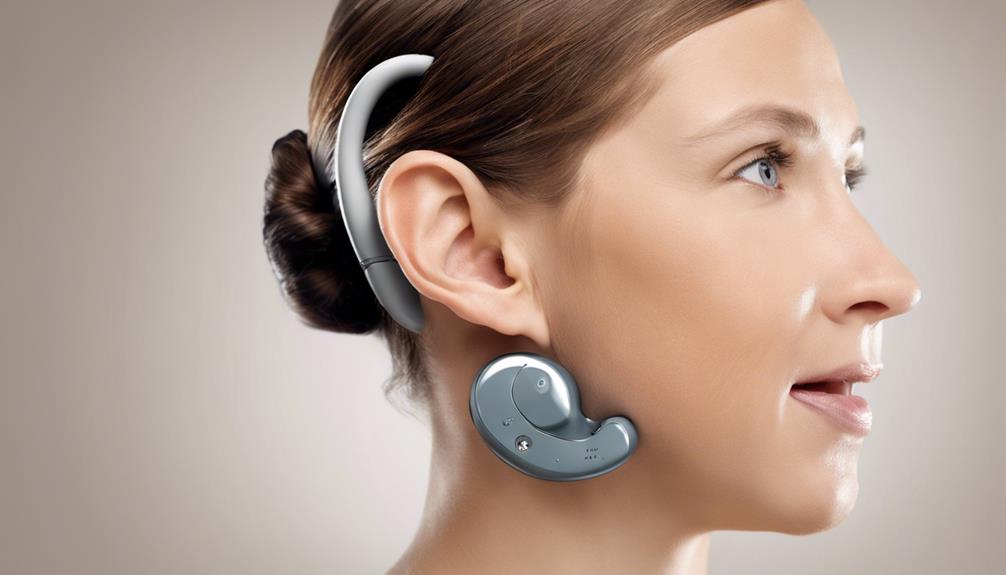In the vast landscape of healthcare options, finding the right fit for cochlear implants can feel like searching for a needle in a haystack. We’ve all faced the challenge of navigating through the maze of services and providers, wondering where to turn for the latest and most reliable information on this essential aspect of hearing health.
But fear not, as we embark on a journey together to unravel the mysteries surrounding the availability and nuances of cochlear implant services near you. Let's shed light on this intricate topic and explore the comprehensive guide that awaits us.
Key Takeaways
- Research local providers specializing in cochlear implants for comprehensive evaluation and care.
- Evaluate candidacy through thorough hearing tests to determine if implants are the best solution.
- Seek financial assistance programs and patient reviews when selecting a provider for cochlear implants.
- Gain insights from educational resources to understand the cochlear implant process and its benefits.
Understanding Cochlear Implants Basics
Understanding the basics of cochlear implants is crucial for individuals considering this form of treatment for hearing loss. Cochlear implants are sophisticated electronic devices designed to stimulate the cochlear nerve directly, aiding in sound perception.
Unlike hearing aids, which amplify sounds, cochlear implants work by capturing sounds through an external microphone and transmitting them to an internal component surgically placed beneath the skin. This implant doesn't restore normal hearing but significantly enhances hearing and speech understanding, especially for individuals who struggle with speech comprehension even with hearing aids.
It's essential to note that cochlear implants are FDA-approved for specific criteria, and their effectiveness varies from person to person. Before undergoing cochlear implant surgery, individuals should consult with an ear, nose, and throat specialist to determine if they're suitable candidates for this intervention.
Finding Local Cochlear Implant Providers

Exploring options for local cochlear implant providers can be facilitated by utilizing online directories or contacting prominent hospitals and medical centers in your vicinity. When seeking the best provider for cochlear implant services, consider the following:
- Research Local Providers: Look for clinics that have experienced professionals specializing in cochlear implants. Ensure they offer comprehensive services from evaluation to post-implant care.
- Check Patient Reviews: Investigate patient feedback to gauge the quality of care provided by different local providers. Positive reviews can indicate a satisfactory experience and successful outcomes.
- Explore Financial Assistance Programs: Some local providers may offer financial aid, insurance coordination, or counseling services to assist patients in managing the costs associated with cochlear implants. Understanding these programs can help alleviate financial concerns during the treatment process.
Evaluating Cochlear Implant Candidacy
Assessing eligibility for cochlear implants involves a series of thorough hearing tests to determine candidacy based on speech understanding abilities and hearing levels with and without aids. These evaluations are conducted by a specialized cochlear implant team to assess the inner ear's function, specifically the cochlear nerve's ability to transmit sound signals to the brain. Hearing aids are typically worn during these tests to evaluate the extent of hearing loss and to determine if cochlear implant surgery is the best course of action.
During the evaluation process, speech understanding abilities are carefully assessed to gauge how well a person can comprehend speech in various environments. This assessment helps the cochlear implant team determine if the individual's hearing loss is severe enough to warrant the use of a cochlear implant. By thoroughly evaluating these factors, the team can accurately identify candidates who are likely to benefit from cochlear implant technology, paving the way for improved hearing outcomes and quality of life.
Navigating the Cochlear Implant Process

We guide individuals through the comprehensive process of cochlear implantation, from initial evaluations to post-surgery care, ensuring optimal outcomes and continued support. When navigating the cochlear implant process, it's crucial to understand the key components involved:
- Candidacy Evaluations: Before undergoing cochlear implant surgery, individuals will undergo thorough evaluations, including hearing tests, speech understanding assessments, and discussions about realistic expectations. These evaluations help determine if a cochlear implant is the appropriate solution for the individual's hearing loss.
- Surgery: The surgical procedure for cochlear implants is typically performed on an outpatient basis, lasting 3-4 hours under general anesthesia. During the surgery, the implant is placed under the skin behind the ear, and the electrode array is inserted into the cochlea to stimulate the auditory nerve.
- Follow-up Care: Post-surgery, individuals will receive initial stimulation and programming of the device. Regular mapping sessions will be scheduled to adjust the settings for optimal speech understanding. Long-term success with cochlear implants hinges on consistent follow-up appointments and collaboration among specialists to ensure ongoing support and maintenance of the device.
Resources for Cochlear Implant Education
Transitioning to the discussion of 'Resources for Cochlear Implant Education,' individuals can access a wealth of informative materials covering various aspects of cochlear implants, including hearing loss, surgical procedures, and insurance considerations. Educational resources play a crucial role in empowering individuals to make informed decisions about cochlear implantation. These resources delve into the complexities of hearing loss, the intricacies of cochlear implants, and the various surgical options available. Understanding the process from patient experiences shared before clinic visits can alleviate concerns and prepare individuals for what to expect.
Popular educational resources such as 'How Hearing Works' and 'Hearing Loss Explained' provide detailed insights into the science behind hearing loss and the benefits of cochlear implants. Seeking guidance from health professionals is highly encouraged to ensure a comprehensive understanding of the implantation procedure and post-operative care. By utilizing these resources, individuals can equip themselves with the knowledge needed to navigate the journey towards improved hearing health confidently.
Frequently Asked Questions
How Much Will Medicare Pay Toward a Cochlear Implant?
Medicare typically covers 80% of the cost of medically necessary cochlear implant surgery and related services. The remaining 20% can be covered by supplemental insurance or out-of-pocket expenses.
Medicare Part B covers the cost of the cochlear device itself, while Part A covers hospital expenses for the surgery. It's essential for patients to check with their specific Medicare plan to confirm coverage details and any additional requirements.
What Is the Best Hospital for Cochlear Implants in the Us?
When it comes to cochlear implants in the US, top hospitals like Johns Hopkins, Massachusetts Eye and Ear, and Mayo Clinic stand out for their expertise.
These institutions boast skilled surgeons, specialized teams, and cutting-edge facilities dedicated to ensuring successful outcomes.
With a focus on comprehensive evaluation, surgery, and follow-up care, patients can expect advanced technology and a multidisciplinary approach.
These leading hospitals are committed to enhancing the quality of life for individuals with hearing loss.
Do Audiologists Deal With Cochlear Implants?
Yes, audiologists play a crucial role in cochlear implant programs. They assess candidacy, conduct evaluations, and provide pre- and post-implantation support. Working closely with surgeons and speech therapists, audiologists ensure optimal outcomes for recipients.
Responsibilities include programming and fine-tuning devices to meet individual needs, educating on use and care, and long-term management through performance monitoring and addressing concerns.
Audiologists are instrumental in the success of cochlear implantation.
What Is a Cochlear Implant Doctor Called?
We're otolaryngologists or ENT specialists who diagnose and treat ear disorders, including hearing loss. We perform surgeries like cochlear implantation to aid patients with severe hearing loss.
Our collaboration with audiologists, speech therapists, and other experts ensures comprehensive care. Our specialized training equips us to manage various hearing-related conditions effectively.
Trust us for expert care in cochlear implant procedures and other ear health matters.
Conclusion
In conclusion, the journey towards better hearing through cochlear implants is a transformative experience for many.
Did you know that over 324,000 cochlear implants have been performed worldwide, providing individuals with the gift of sound?
With advancements in technology and expert care, the future looks brighter for those seeking improved hearing through cochlear implantation.











